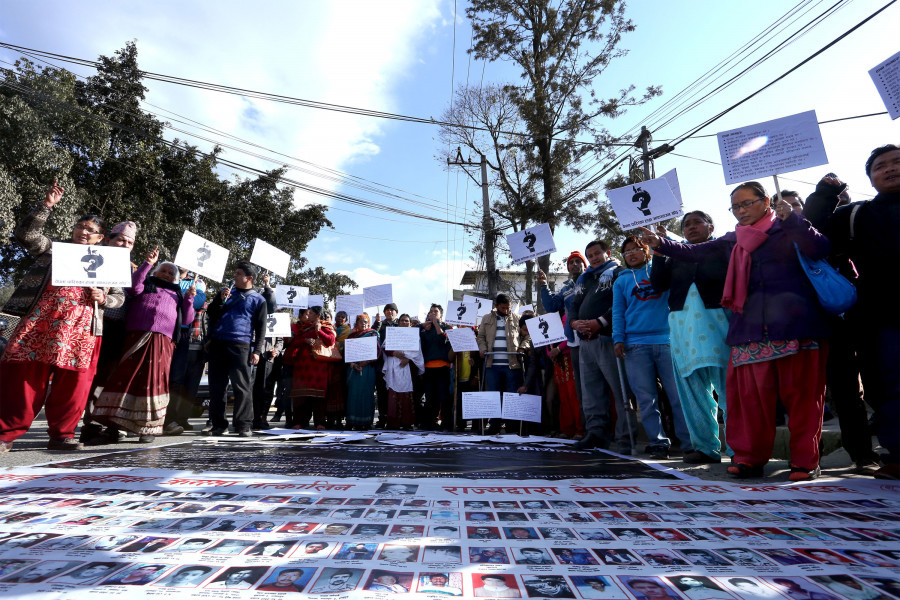National
Nepal yet to fully implement a single recommendation on transitional justice, says universal periodic report by non-governmental organisations
The UN Human Rights Council’s Universal Periodic review has been postponed until January, but officials have little progress to show to the international community.
Binod Ghimire
Five years since the United Nations Human Rights Council’s Universal Periodic Review, Nepal’s government has put on a dismal performance when it comes to transitional justice, says a report by a consortium of non-governmental organisations.
The report, submitted to the council on behalf of 440 non-government organisations advocating for human rights, says not a single commitment expressed by the government during the review in 2015 has been fully implemented.
Of the 19 recommendations provided to the Nepal government during the review, only 11 have been partially implemented while eight have been left fully unimplemented, says the report.
The periodic review, conducted every five years, had been scheduled for November this year, but has been postponed until January next year due to Covid-19 pandemic. Along with a government report on the progress made in the implementation of the recommendations, the National Human Rights Commission and different non-government organisations also submit separate reports in the council during the review.
The government had accepted 18 recommendations and ‘noted’ one recommendation made by different countries during the review in November 2015. However, it has wasted five years without taking any concrete measures to implement its own commitments, says the report.
In reply to most of the recommendations, the government had agreed to revise the Enforced Disappearance Enquiry, Truth and Reconciliation Act which has provisions of amnesty even for those involved in severe human rights violations.
During the last review, Canada had recommended steps towards ensuring that the Truth and Reconciliation Commission and the Commission on Disappearances function in accordance with international standards, and bring perpetrators of serious human rights violations to justice. Similarly, Belgium had asked that the the Act on the Commission on Investigation of Enforced Disappeared Persons, Truth and Reconciliation comply with international norms, particularly with regard to the definition of amnesty, witness protection and delays in processing complaints.
The Swiss government wanted Nepal to implement the February 26, 2015 decision by the Supreme Court to strike down provisions of amnesty in the Act. Despite agreeing to the recommendations, the government hasn’t amended the Act.
The human rights commission has raised the issue in its report to the council. “We have reported that the government is reluctant towards providing justice to the thousands of conflict victims,” Bed Bhattarai, secretary at the commission, told the Post.
The Oli government, in January, appointed new teams to the Truth and Reconciliation Commission and the Commission of Investigation on Enforced Disappeared Persons bidding farewell to the previous office bearers accusing them of failing to do their jobs. However, six months after starting work, the new team has also failed to make headway in the investigation of war-era cases of human rights violations. The truth commission had received over 63,000 cases while the commission on the disappeared has around 2,500 cases to investigate.
Meanwhile, conflict victims’ leaders say they have no hope that the new team will work towards ensuring justice for them. “They (officials) now have the Covid-19 pandemic as an excuse to hide their incompetence,” Bhagiram Chaudhari, chairperson of Conflict Victim’s Common Platform, told the Post.
Officials working on the government’s UPR report, which is due in October, said while Nepal’s performance under transitional justice does not meet expectations, progress has been made on other fronts. The government had made 152 commitments ranging from child and women rights, rights of indigenous communities along with transitional justice, during the UPR meeting in 2015. “I agree that we haven’t fulfilled our commitments when it comes to transitional justice,” Poshan Chandra Subedi, an under-secretary at Prime Minister’s Office, told the Post.




 14.24°C Kathmandu
14.24°C Kathmandu















